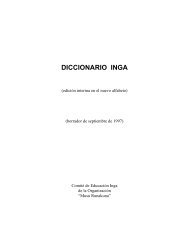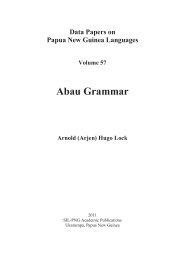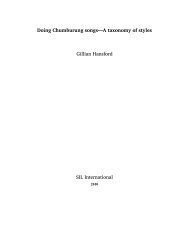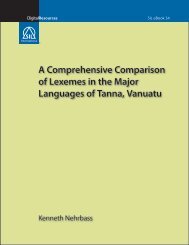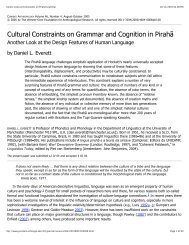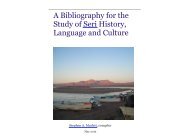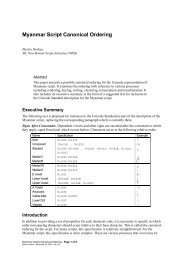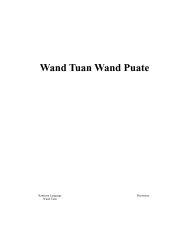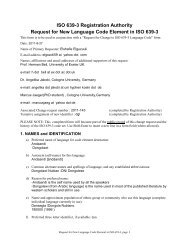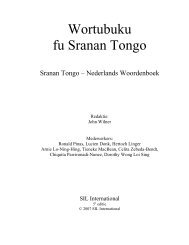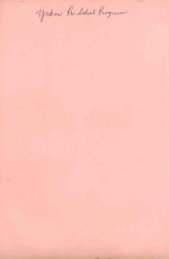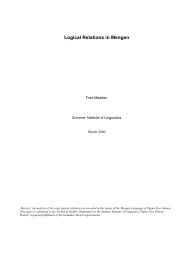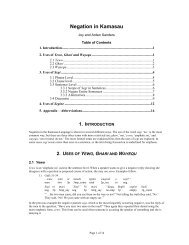- Page 1 and 2:
DICCIONARIO CHINANTECO de la diásp
- Page 3 and 4:
DICCIONARIO CHINANTECO de la diásp
- Page 5 and 6:
CONTENIDO Cuadros principales......
- Page 7 and 8:
AGRADECIMIENTO Esta obra nació de
- Page 9 and 10:
INTRODUCCIÓN ¿Por qué se nombre
- Page 11 and 12:
INTRODUCCIÓN Y así es este diccio
- Page 13 and 14:
EL ALFABETO CHINANTECO Una diferenc
- Page 15 and 16:
ESTRUCTURA DEL ARTÍCULO 1. Los ele
- Page 17 and 18:
ESTRUCTURA DEL ARTÍCULO El siguien
- Page 19 and 20:
ESTRUCTURA DEL ARTÍCULO Se incluye
- Page 21 and 22:
ESTRUCTURA DEL ARTÍCULO 8. Comenta
- Page 23:
adj adjetivo adv adverbio an animad
- Page 27 and 28:
¹ DICCIONARIO CHINANTECO banh² To
- Page 29 and 30:
í² dsǿa¹² DICCIONARIO CHINANTE
- Page 31 and 32:
ung² DICCIONARIO CHINANTECO ca² d
- Page 33 and 34:
ca³ DICCIONARIO CHINANTECO cágh¹
- Page 35 and 36:
can¹ ni³ DICCIONARIO CHINANTECO c
- Page 37 and 38:
cáng² DICCIONARIO CHINANTECO cën
- Page 39 and 40:
cog² DICCIONARIO CHINANTECO coh¹
- Page 41 and 42:
cø² DICCIONARIO CHINANTECO cøh¹
- Page 43 and 44:
cøn¹ DICCIONARIO CHINANTECO cu¹
- Page 45 and 46:
cu² jmángh¹ DICCIONARIO CHINANTE
- Page 47 and 48:
cu³ŋií³ DICCIONARIO CHINANTECO
- Page 49 and 50:
cugh³ DICCIONARIO CHINANTECO cuø
- Page 51 and 52:
cuøh³ hiíh³ DICCIONARIO CHINANT
- Page 53 and 54:
cuuh² DICCIONARIO CHINANTECO chi¹
- Page 55 and 56:
chi²láh² DICCIONARIO CHINANTECO
- Page 57 and 58:
chi³gúg¹ pa³ DICCIONARIO CHINAN
- Page 59 and 60:
chiag¹² DICCIONARIO CHINANTECO ch
- Page 61 and 62:
chiég² DICCIONARIO CHINANTECO chi
- Page 63 and 64:
chio¹³ DICCIONARIO CHINANTECO chi
- Page 65 and 66:
chiúh³ hi³ŋiíh¹ DICCIONARIO C
- Page 67 and 68:
dsa² bong³ cah³ DICCIONARIO CHIN
- Page 69 and 70:
dsa² hniu³ DICCIONARIO CHINANTECO
- Page 71 and 72:
dsa² ma²cun² DICCIONARIO CHINANT
- Page 73 and 74:
dsa² té¹² jǿg³ DICCIONARIO CH
- Page 75 and 76:
dsag³ jŋëh¹² dsa² DICCIONARIO
- Page 77 and 78:
dsén² DICCIONARIO CHINANTECO dsi
- Page 79 and 80:
dsiag¹² DICCIONARIO CHINANTECO ds
- Page 81 and 82:
dsie¹² løh¹² DICCIONARIO CHINA
- Page 83 and 84:
dsíg² jŋiu² DICCIONARIO CHINANT
- Page 85 and 86:
dsii³niang¹³ DICCIONARIO CHINANT
- Page 87 and 88:
dsiúh¹ DICCIONARIO CHINANTECO dso
- Page 89 and 90:
dsø²tagh¹ DICCIONARIO CHINANTECO
- Page 91 and 92:
dsǿa¹² DICCIONARIO CHINANTECO ds
- Page 93 and 94:
dsǿh³ DICCIONARIO CHINANTECO gan
- Page 95 and 96:
goh² DICCIONARIO CHINANTECO gǿi¹
- Page 97 and 98:
gu³jøh² DICCIONARIO CHINANTECO g
- Page 99 and 100:
gúh¹³ DICCIONARIO CHINANTECO gui
- Page 101 and 102:
guiég² DICCIONARIO CHINANTECO gui
- Page 103 and 104:
guiig² DICCIONARIO CHINANTECO gui
- Page 105 and 106:
guiuh¹³ DICCIONARIO CHINANTECO gu
- Page 107 and 108:
guøh³ DICCIONARIO CHINANTECO guu
- Page 109 and 110:
h DICCIONARIO CHINANTECO ha² lǿih
- Page 111 and 112:
hagh¹ DICCIONARIO CHINANTECO haih
- Page 113 and 114:
hán¹³ hogh¹² DICCIONARIO CHINA
- Page 115 and 116:
héh¹ cog³ DICCIONARIO CHINANTECO
- Page 117 and 118:
héin¹ DICCIONARIO CHINANTECO hen
- Page 119 and 120:
hén² DICCIONARIO CHINANTECO hënh
- Page 121 and 122:
jneng², frijoles cuøi² lá¹²,
- Page 123 and 124:
hí² juu¹² DICCIONARIO CHINANTEC
- Page 125 and 126:
hian² hieg² DICCIONARIO CHINANTEC
- Page 127 and 128:
hieh¹² cuø³; león americano, p
- Page 129 and 130:
hig² DICCIONARIO CHINANTECO hính
- Page 131 and 132:
hiog² DICCIONARIO CHINANTECO hiu³
- Page 133 and 134:
hiúg³ DICCIONARIO CHINANTECO hlai
- Page 135 and 136:
hlég² reh² DICCIONARIO CHINANTEC
- Page 137 and 138:
hliuh¹³ DICCIONARIO CHINANTECO hm
- Page 139 and 140:
hma² cuøi², caña de azúcar hma
- Page 141 and 142:
hma² cuøh³ héh¹ DICCIONARIO CH
- Page 143 and 144:
hma² hliúg² mung² DICCIONARIO C
- Page 145 and 146:
hma² li³ jmøi² DICCIONARIO CHIN
- Page 147 and 148:
hma² sai³¹ DICCIONARIO CHINANTEC
- Page 149 and 150:
hmáh³ DICCIONARIO CHINANTECO hmih
- Page 151 and 152:
hmóng³ DICCIONARIO CHINANTECO hm
- Page 153 and 154:
hmøi² guø¹³ DICCIONARIO CHINAN
- Page 155 and 156:
hnei¹³ tig² DICCIONARIO CHINANTE
- Page 157 and 158:
hniú¹² DICCIONARIO CHINANTECO hn
- Page 159 and 160:
hŋa³ chiunh² DICCIONARIO CHINANT
- Page 161 and 162:
ho¹² DICCIONARIO CHINANTECO hóh
- Page 163 and 164:
hø³tsóh¹ DICCIONARIO CHINANTECO
- Page 165 and 166:
høg² mong³ DICCIONARIO CHINANTEC
- Page 167 and 168:
hú¹ DICCIONARIO CHINANTECO huan¹
- Page 169 and 170:
hug¹² DICCIONARIO CHINANTECO huø
- Page 171 and 172:
huǿi³ DICCIONARIO CHINANTECO iah
- Page 173 and 174:
já¹² DICCIONARIO CHINANTECO ja³
- Page 175 and 176:
ja³ hính³ DICCIONARIO CHINANTECO
- Page 177 and 178:
ja³ ma²ŋio¹ DICCIONARIO CHINANT
- Page 179 and 180:
jág¹² hieg² DICCIONARIO CHINANT
- Page 181 and 182:
jah¹ma³hnai³ DICCIONARIO CHINANT
- Page 183 and 184:
jah¹tu³ DICCIONARIO CHINANTECO j
- Page 185 and 186:
møi²; gavilán, águila tu² tsø
- Page 187 and 188:
jáin³ DICCIONARIO CHINANTECO jan
- Page 189 and 190:
janh¹² chii² ma¹quiíh² DICCIO
- Page 191 and 192:
jein¹² DICCIONARIO CHINANTECO jé
- Page 193 and 194:
jénh¹² DICCIONARIO CHINANTECO j
- Page 195 and 196:
ji³ DICCIONARIO CHINANTECO jián¹
- Page 197 and 198:
jin² DICCIONARIO CHINANTECO jinh³
- Page 199 and 200:
jla¹² pein³ DICCIONARIO CHINANTE
- Page 201 and 202:
jløa¹² mø³ni³ DICCIONARIO CHI
- Page 203 and 204:
jmai³ ja³ DICCIONARIO CHINANTECO
- Page 205 and 206:
jmi² jon¹² DICCIONARIO CHINANTEC
- Page 207 and 208:
jmo¹² hioh¹² DICCIONARIO CHINAN
- Page 209 and 210:
jmó² ta³ DICCIONARIO CHINANTECO
- Page 211 and 212:
jmø²jné² DICCIONARIO CHINANTECO
- Page 213 and 214:
jmøah¹² DICCIONARIO CHINANTECO j
- Page 215 and 216:
jmøi² lán¹ DICCIONARIO CHINANTE
- Page 217 and 218:
jne¹³ DICCIONARIO CHINANTECO jnen
- Page 219 and 220:
jní² DICCIONARIO CHINANTECO jnie
- Page 221 and 222:
jnøa¹² DICCIONARIO CHINANTECO j
- Page 223 and 224:
jŋieng¹³ DICCIONARIO CHINANTECO
- Page 225 and 226:
jog¹ DICCIONARIO CHINANTECO jogh²
- Page 227 and 228:
jø² DICCIONARIO CHINANTECO jøa³
- Page 229 and 230:
jǿg³ DICCIONARIO CHINANTECO jǿg
- Page 231 and 232:
jǿg³ rø²tsøi¹² láh¹ ni³ D
- Page 233 and 234:
Ju²di³ DICCIONARIO CHINANTECO ju
- Page 235 and 236:
juan¹² DICCIONARIO CHINANTECO jue
- Page 237 and 238:
jugh² DICCIONARIO CHINANTECO juøi
- Page 239 and 240:
juøin³ DICCIONARIO CHINANTECO juu
- Page 241 and 242: juú² dsí² DICCIONARIO CHINANTEC
- Page 243 and 244: la³cuø¹² DICCIONARIO CHINANTECO
- Page 245 and 246: láh¹ la² DICCIONARIO CHINANTECO
- Page 247 and 248: lán² DICCIONARIO CHINANTECO lég
- Page 249 and 250: li¹ DICCIONARIO CHINANTECO lí³ h
- Page 251 and 252: lieh¹ DICCIONARIO CHINANTECO lióh
- Page 253 and 254: lø² DICCIONARIO CHINANTECO lǿ²
- Page 255 and 256: lǿa¹² DICCIONARIO CHINANTECO lø
- Page 257 and 258: lǿg³ DICCIONARIO CHINANTECO luh¹
- Page 259 and 260: má¹ DICCIONARIO CHINANTECO ma²jm
- Page 261 and 262: ma²tsønh² DICCIONARIO CHINANTECO
- Page 263 and 264: Máh² Cuú¹ Dsai¹ DICCIONARIO CH
- Page 265 and 266: më́h² DICCIONARIO CHINANTECO mi
- Page 267 and 268: mi²dsën¹³ DICCIONARIO CHINANTEC
- Page 269 and 270: mi²hlég³ DICCIONARIO CHINANTECO
- Page 271 and 272: mi²quien¹² DICCIONARIO CHINANTEC
- Page 273 and 274: mi³dsiágh³ DICCIONARIO CHINANTEC
- Page 275 and 276: mih² DICCIONARIO CHINANTECO mong¹
- Page 277 and 278: mø³ne¹ DICCIONARIO CHINANTECO m
- Page 279 and 280: møh² hmóng² DICCIONARIO CHINANT
- Page 281 and 282: møi¹tǿg³ DICCIONARIO CHINANTECO
- Page 283 and 284: mǿi² can³ DICCIONARIO CHINANTECO
- Page 285 and 286: mung² tag³ løg² DICCIONARIO CHI
- Page 287 and 288: nang³ quiah¹² ca³juu² DICCIONA
- Page 289 and 290: néng³ DICCIONARIO CHINANTECO ni³
- Page 291: ni³tǿng² DICCIONARIO CHINANTECO
- Page 295 and 296: nung² DICCIONARIO CHINANTECO ŋáh
- Page 297 and 298: ŋë́² DICCIONARIO CHINANTECO ŋi
- Page 299 and 300: ŋii¹juǿi² DICCIONARIO CHINANTEC
- Page 301 and 302: ŋii³noh¹³ DICCIONARIO CHINANTEC
- Page 303 and 304: ŋiih¹jmó³ DICCIONARIO CHINANTEC
- Page 305 and 306: ŋǿ¹² hiu³ ŋii³ DICCIONARIO C
- Page 307 and 308: øg² DICCIONARIO CHINANTECO pi²ra
- Page 309 and 310: quiagh¹² DICCIONARIO CHINANTECO q
- Page 311 and 312: quianh¹³dsa DICCIONARIO CHINANTEC
- Page 313 and 314: quieng¹³ DICCIONARIO CHINANTECO q
- Page 315 and 316: quiin² DICCIONARIO CHINANTECO qui
- Page 317 and 318: quiun¹² DICCIONARIO CHINANTECO re
- Page 319 and 320: Rø²ca² DICCIONARIO CHINANTECO r
- Page 321 and 322: ǿg² jinh² DICCIONARIO CHINANTECO
- Page 323 and 324: sei³ máh³ DICCIONARIO CHINANTECO
- Page 325 and 326: sian³ DICCIONARIO CHINANTECO sín
- Page 327 and 328: siúh² DICCIONARIO CHINANTECO Sø
- Page 329 and 330: ta¹ huø³ DICCIONARIO CHINANTECO
- Page 331 and 332: ta³ DICCIONARIO CHINANTECO ta³ jo
- Page 333 and 334: tag¹³ DICCIONARIO CHINANTECO tah
- Page 335 and 336: tah³ DICCIONARIO CHINANTECO tan¹
- Page 337 and 338: tan¹² ŋií³ DICCIONARIO CHINANT
- Page 339 and 340: tangh² juu¹² DICCIONARIO CHINANT
- Page 341 and 342: tei² DICCIONARIO CHINANTECO ten¹
- Page 343 and 344:
ténh¹³ DICCIONARIO CHINANTECO ti
- Page 345 and 346:
ti³dsaih¹³ DICCIONARIO CHINANTEC
- Page 347 and 348:
tian¹² DICCIONARIO CHINANTECO tie
- Page 349 and 350:
tio¹ DICCIONARIO CHINANTECO tióh
- Page 351 and 352:
tiú¹² DICCIONARIO CHINANTECO ti
- Page 353 and 354:
togh¹² jǿg³ DICCIONARIO CHINANT
- Page 355 and 356:
ton¹ lúg¹ guií² DICCIONARIO CH
- Page 357 and 358:
tø² DICCIONARIO CHINANTECO tø²t
- Page 359 and 360:
tøa¹² hieh¹² DICCIONARIO CHINA
- Page 361 and 362:
tǿg³ DICCIONARIO CHINANTECO trein
- Page 363 and 364:
tuh¹² DICCIONARIO CHINANTECO tsa
- Page 365 and 366:
tsa¹ŋë́h² dsǿa¹² DICCIONARI
- Page 367 and 368:
tsang³ DICCIONARIO CHINANTECO tsei
- Page 369 and 370:
tsenh¹² DICCIONARIO CHINANTECO ts
- Page 371 and 372:
tsih¹³ DICCIONARIO CHINANTECO tso
- Page 373 and 374:
tsø²jan¹² jǿg³ DICCIONARIO CH
- Page 375 and 376:
tsøg² DICCIONARIO CHINANTECO tsø
- Page 377 and 378:
tsǿn¹² DICCIONARIO CHINANTECO u
- Page 379 and 380:
uai¹³ DICCIONARIO CHINANTECO uǿi
- Page 381 and 382:
uøin² jøg² DICCIONARIO CHINANTE
- Page 383:
DICCIONARIO ESPAÑOL ∼ CHINANTECO
- Page 386 and 387:
abejorro DICCIONARIO CHINANTECO abr
- Page 388 and 389:
acahual DICCIONARIO CHINANTECO áci
- Page 390 and 391:
acostar DICCIONARIO CHINANTECO acu
- Page 392 and 393:
además DICCIONARIO CHINANTECO ador
- Page 394 and 395:
afuera DICCIONARIO CHINANTECO agric
- Page 396 and 397:
aguado DICCIONARIO CHINANTECO ahoga
- Page 398 and 399:
alcalde DICCIONARIO CHINANTECO aler
- Page 400 and 401:
almorzar DICCIONARIO CHINANTECO alz
- Page 402 and 403:
ambos DICCIONARIO CHINANTECO analiz
- Page 404 and 405:
animar DICCIONARIO CHINANTECO anter
- Page 406 and 407:
anunciar DICCIONARIO CHINANTECO apa
- Page 408 and 409:
aplaudir DICCIONARIO CHINANTECO apr
- Page 410 and 411:
arbusto DICCIONARIO CHINANTECO ardi
- Page 412 and 413:
arrebatar DICCIONARIO CHINANTECO ar
- Page 414 and 415:
asa DICCIONARIO CHINANTECO asistenc
- Page 416 and 417:
asustar DICCIONARIO CHINANTECO aten
- Page 418 and 419:
ausentar DICCIONARIO CHINANTECO aye
- Page 420 and 421:
ajo DICCIONARIO CHINANTECO banco ab
- Page 422 and 423:
astar DICCIONARIO CHINANTECO bejuco
- Page 424 and 425:
eneficiar DICCIONARIO CHINANTECO bl
- Page 426 and 427:
orrador DICCIONARIO CHINANTECO braz
- Page 428 and 429:
uey DICCIONARIO CHINANTECO caballo
- Page 430 and 431:
cacaotero DICCIONARIO CHINANTECO ca
- Page 432 and 433:
calado DICCIONARIO CHINANTECO Calix
- Page 434 and 435:
cambiar DICCIONARIO CHINANTECO camp
- Page 436 and 437:
canutillo DICCIONARIO CHINANTECO ca
- Page 438 and 439:
carnero DICCIONARIO CHINANTECO casa
- Page 440 and 441:
castrado DICCIONARIO CHINANTECO ceb
- Page 442 and 443:
cerbatana DICCIONARIO CHINANTECO ce
- Page 444 and 445:
cicada DICCIONARIO CHINANTECO cilan
- Page 446 and 447:
claro DICCIONARIO CHINANTECO cobard
- Page 448 and 449:
cocoxóchitl DICCIONARIO CHINANTECO
- Page 450 and 451:
colibrí DICCIONARIO CHINANTECO com
- Page 452 and 453:
comezón DICCIONARIO CHINANTECO com
- Page 454 and 455:
comprender DICCIONARIO CHINANTECO c
- Page 456 and 457:
confiable DICCIONARIO CHINANTECO co
- Page 458 and 459:
consigo DICCIONARIO CHINANTECO cont
- Page 460 and 461:
contusión DICCIONARIO CHINANTECO c
- Page 462 and 463:
correspondencia DICCIONARIO CHINANT
- Page 464 and 465:
costo DICCIONARIO CHINANTECO creenc
- Page 466 and 467:
crucero DICCIONARIO CHINANTECO cuan
- Page 468 and 469:
cuatrojillo DICCIONARIO CHINANTECO
- Page 470 and 471:
cuidar DICCIONARIO CHINANTECO cuña
- Page 472 and 473:
chaparro DICCIONARIO CHINANTECO chi
- Page 474 and 475:
Chinantlilla DICCIONARIO CHINANTECO
- Page 476 and 477:
chupamirto DICCIONARIO CHINANTECO d
- Page 478 and 479:
debajo DICCIONARIO CHINANTECO decla
- Page 480 and 481:
delantera DICCIONARIO CHINANTECO de
- Page 482 and 483:
desacuerdo DICCIONARIO CHINANTECO d
- Page 484 and 485:
desenrollar DICCIONARIO CHINANTECO
- Page 486 and 487:
destrozar DICCIONARIO CHINANTECO de
- Page 488 and 489:
diente DICCIONARIO CHINANTECO dique
- Page 490 and 491:
disponer DICCIONARIO CHINANTECO dob
- Page 492 and 493:
dondequiera DICCIONARIO CHINANTECO
- Page 494 and 495:
educar DICCIONARIO CHINANTECO embar
- Page 496 and 497:
emplear DICCIONARIO CHINANTECO ence
- Page 498 and 499:
encorvado DICCIONARIO CHINANTECO en
- Page 500 and 501:
enrollado DICCIONARIO CHINANTECO en
- Page 502 and 503:
envejecer DICCIONARIO CHINANTECO en
- Page 504 and 505:
escombro DICCIONARIO CHINANTECO esf
- Page 506 and 507:
espesura DICCIONARIO CHINANTECO est
- Page 508 and 509:
estibado DICCIONARIO CHINANTECO Eva
- Page 510 and 511:
exterior DICCIONARIO CHINANTECO fal
- Page 512 and 513:
figura DICCIONARIO CHINANTECO flor
- Page 514 and 515:
Francisca DICCIONARIO CHINANTECO fr
- Page 516 and 517:
fundado DICCIONARIO CHINANTECO gall
- Page 518 and 519:
gastado DICCIONARIO CHINANTECO gene
- Page 520 and 521:
gordo DICCIONARIO CHINANTECO granil
- Page 522 and 523:
guaco DICCIONARIO CHINANTECO guayab
- Page 524 and 525:
hábil DICCIONARIO CHINANTECO habla
- Page 526 and 527:
hacia DICCIONARIO CHINANTECO hallar
- Page 528 and 529:
heno DICCIONARIO CHINANTECO hierba
- Page 530 and 531:
hipar DICCIONARIO CHINANTECO hoja 2
- Page 532 and 533:
hondura DICCIONARIO CHINANTECO horm
- Page 534 and 535:
huele de noche DICCIONARIO CHINANTE
- Page 536 and 537:
iglesia DICCIONARIO CHINANTECO impo
- Page 538 and 539:
infección DICCIONARIO CHINANTECO i
- Page 540 and 541:
inútil DICCIONARIO CHINANTECO iras
- Page 542 and 543:
jahuacte DICCIONARIO CHINANTECO jí
- Page 544 and 545:
jugo DICCIONARIO CHINANTECO juzgado
- Page 546 and 547:
lago DICCIONARIO CHINANTECO lastima
- Page 548 and 549:
lengua DICCIONARIO CHINANTECO levan
- Page 550 and 551:
limpio DICCIONARIO CHINANTECO lodo
- Page 552 and 553:
lugar DICCIONARIO CHINANTECO llave
- Page 554 and 555:
llevar DICCIONARIO CHINANTECO lluvi
- Page 556 and 557:
madurar DICCIONARIO CHINANTECO mala
- Page 558 and 559:
manantial DICCIONARIO CHINANTECO ma
- Page 560 and 561:
mantis religiosa DICCIONARIO CHINAN
- Page 562 and 563:
mascar DICCIONARIO CHINANTECO mayor
- Page 564 and 565:
medio DICCIONARIO CHINANTECO memori
- Page 566 and 567:
meta DICCIONARIO CHINANTECO mezclad
- Page 568 and 569:
miembro DICCIONARIO CHINANTECO mise
- Page 570 and 571:
mojar DICCIONARIO CHINANTECO molest
- Page 572 and 573:
monte DICCIONARIO CHINANTECO mortaj
- Page 574 and 575:
muchísimo DICCIONARIO CHINANTECO m
- Page 576 and 577:
nacer DICCIONARIO CHINANTECO Nativi
- Page 578 and 579:
Nemesio DICCIONARIO CHINANTECO no e
- Page 580 and 581:
novenario DICCIONARIO CHINANTECO nu
- Page 582 and 583:
ocote DICCIONARIO CHINANTECO oído
- Page 584 and 585:
olfatear DICCIONARIO CHINANTECO opr
- Page 586 and 587:
orinar DICCIONARIO CHINANTECO otro
- Page 588 and 589:
padrino DICCIONARIO CHINANTECO palm
- Page 590 and 591:
paloma DICCIONARIO CHINANTECO panza
- Page 592 and 593:
parado DICCIONARIO CHINANTECO pared
- Page 594 and 595:
Pascacio DICCIONARIO CHINANTECO pat
- Page 596 and 597:
Pedro DICCIONARIO CHINANTECO pegar
- Page 598 and 599:
peluquero DICCIONARIO CHINANTECO pe
- Page 600 and 601:
perico DICCIONARIO CHINANTECO perso
- Page 602 and 603:
pestaña DICCIONARIO CHINANTECO pic
- Page 604 and 605:
pimpollo DICCIONARIO CHINANTECO pio
- Page 606 and 607:
plantado DICCIONARIO CHINANTECO pl
- Page 608 and 609:
pobre DICCIONARIO CHINANTECO polill
- Page 610 and 611:
pónite DICCIONARIO CHINANTECO por
- Page 612 and 613:
postecillo DICCIONARIO CHINANTECO p
- Page 614 and 615:
presidencia DICCIONARIO CHINANTECO
- Page 616 and 617:
problema DICCIONARIO CHINANTECO pro
- Page 618 and 619:
propagar DICCIONARIO CHINANTECO pr
- Page 620 and 621:
puerto DICCIONARIO CHINANTECO punza
- Page 622 and 623:
quehaceres DICCIONARIO CHINANTECO q
- Page 624 and 625:
quizá DICCIONARIO CHINANTECO raíz
- Page 626 and 627:
asposo DICCIONARIO CHINANTECO real
- Page 628 and 629:
ecoger DICCIONARIO CHINANTECO recor
- Page 630 and 631:
eferente DICCIONARIO CHINANTECO reg
- Page 632 and 633:
eino DICCIONARIO CHINANTECO renacua
- Page 634 and 635:
eportar DICCIONARIO CHINANTECO resp
- Page 636 and 637:
etirar DICCIONARIO CHINANTECO revé
- Page 638 and 639:
iqueza DICCIONARIO CHINANTECO rocia
- Page 640 and 641:
onzar DICCIONARIO CHINANTECO saber
- Page 642 and 643:
sagaz DICCIONARIO CHINANTECO salir
- Page 644 and 645:
salvación DICCIONARIO CHINANTECO s
- Page 646 and 647:
sección DICCIONARIO CHINANTECO sei
- Page 648 and 649:
sentido DICCIONARIO CHINANTECO sepa
- Page 650 and 651:
servir DICCIONARIO CHINANTECO sierr
- Page 652 and 653:
sincero DICCIONARIO CHINANTECO sobr
- Page 654 and 655:
solamente DICCIONARIO CHINANTECO so
- Page 656 and 657:
soso DICCIONARIO CHINANTECO sueño
- Page 658 and 659:
suspirar DICCIONARIO CHINANTECO tam
- Page 660 and 661:
tasajo DICCIONARIO CHINANTECO tela
- Page 662 and 663:
temprano DICCIONARIO CHINANTECO ten
- Page 664 and 665:
tepetotutleño DICCIONARIO CHINANTE
- Page 666 and 667:
tieso DICCIONARIO CHINANTECO tirar
- Page 668 and 669:
tocón DICCIONARIO CHINANTECO todo
- Page 670 and 671:
topil DICCIONARIO CHINANTECO tortea
- Page 672 and 673:
traer DICCIONARIO CHINANTECO transf
- Page 674 and 675:
trenzado DICCIONARIO CHINANTECO tri
- Page 676 and 677:
tuétano DICCIONARIO CHINANTECO uni
- Page 678 and 679:
urdidera DICCIONARIO CHINANTECO vag
- Page 680 and 681:
vapor DICCIONARIO CHINANTECO vena s
- Page 682 and 683:
ventana DICCIONARIO CHINANTECO verd
- Page 684 and 685:
viaje DICCIONARIO CHINANTECO viejo
- Page 686 and 687:
viruela DICCIONARIO CHINANTECO volc
- Page 688 and 689:
vuelta DICCIONARIO CHINANTECO yerba
- Page 690 and 691:
zacate esp. DICCIONARIO CHINANTECO
- Page 693:
GRAMÁTICA CHINANTECA
- Page 696 and 697:
GRAMÁTICA CHINANTECA En sílaba En
- Page 698 and 699:
GRAMÁTICA CHINANTECA ë bën¹²
- Page 700 and 701:
GRAMÁTICA CHINANTECA ah tah¹²
- Page 702 and 703:
GRAMÁTICA CHINANTECA løg² mǿi²
- Page 704 and 705:
GRAMÁTICA CHINANTECA Sustantivos c
- Page 706 and 707:
GRAMÁTICA CHINANTECA Verbos de est
- Page 708 and 709:
GRAMÁTICA CHINANTECA Los 4,000 art
- Page 710 and 711:
GRAMÁTICA CHINANTECA se combina co
- Page 712 and 713:
GRAMÁTICA CHINANTECA Prefijos de d
- Page 714 and 715:
GRAMÁTICA CHINANTECA Con el verbo
- Page 716 and 717:
GRAMÁTICA CHINANTECA GRUPO A TERCE
- Page 718 and 719:
GRAMÁTICA CHINANTECA Se nota en lo
- Page 720 and 721:
GRAMÁTICA CHINANTECA Las 19 conjug
- Page 722 and 723:
GRAMÁTICA CHINANTECA El tipo de pa
- Page 724 and 725:
GRAMÁTICA CHINANTECA configuracion
- Page 726 and 727:
GRAMÁTICA CHINANTECA los cambios v
- Page 728 and 729:
GRAMÁTICA CHINANTECA una conjugaci
- Page 731:
APÉNDICES
- Page 734 and 735:
aba jmø³høah¹³ bazo jlǿi³ bi
- Page 736 and 737:
hma² høng² nung² tipo de hierba
- Page 738 and 739:
janh¹² nih¹³ høng² punta tier
- Page 741 and 742:
i²hníh² pájaro carpintero búh
- Page 743 and 744:
mih¹² tég² tipo de avispa mong
- Page 745 and 746:
Cøh³ ŋií² Tlatepuzco (San Pedr
- Page 747 and 748:
Jéin³ Eugenio Ji²ra³ Geraldo, G
- Page 749 and 750:
Abelina Chi³be²li³na Abraham Sø
- Page 751:
óh² compadre cu²ba¹³ compadre
- Page 754 and 755:
BIBLIOGRAFÍA ———. 1968. Pala



